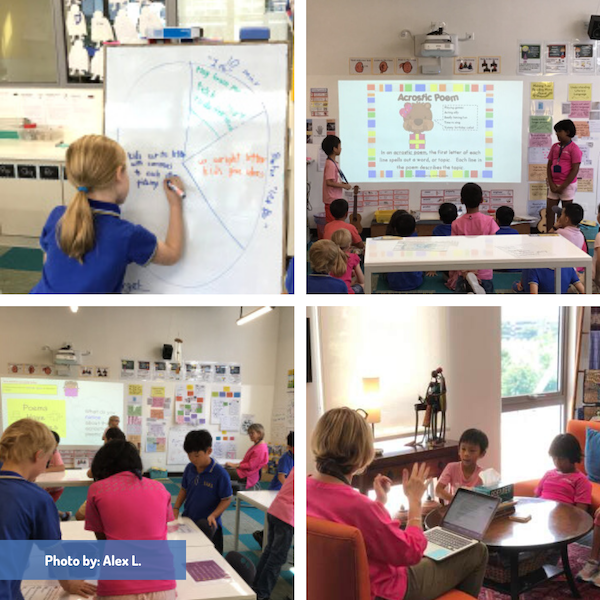“It all started by accident, just before recess, on a Friday. Out of a need to recognize and give a voice to students who were consistently acting as role models in class, I pulled them aside and told them how much I appreciated them.
‘I asked them how they would like to be recognized, and the following week I noticed many ‘covert’ recess meetings, and eventually, the group of three came back to me and said: “Can we be teachers for a day?”
At ISKL, we encourage students to think out of the box so that they can develop the skills, attitudes, and knowledge they need to take on new responsibilities and challenges.
One such instance came up when the Elementary School Grade 2 teacher Alex Lancia faced this exciting proposition from his students.
And to this, he responded with, “Ahhhh-sure, maaaaybe? Let me think about it.”
Thankfully, to this day, it remains the most memorable hour of his teaching career (and the best part was that he didn’t even have to do any teaching!
What followed was an exciting play-by-play where the students learned the necessary steps to teach a class as ‘teachers.’
“And just like that, students were off to practice on their own. The “teachers” had a small group going for those who needed some help, and another copied my roving clipboard strategy to “take notes” and “collect data,” Alex mentioned.
“Another “teacher” was busy conferring and clarifying questions. I think it’s at this point that I started tearing up a bit,” continued Alex.
Even ISKL’s Elementary School Principal, Julie Olson, was roped into the special lesson.
“During observation lessons, it was time for the “teachers” to step into Ms. Julie’s office and debrief”.
“Ms. Julie rocked it, with proper notes on her computer, asking them probing questions – it was the real deal,” Alex shares.
Alex continued that the reason this experiment went well due to the support of admin and co-teachers, who were keen on trying out new things.
“In retrospect, it worked out more wonderfully than I could ever have imagined, but there was no guarantee of that being the case – and everyone was willing to go along with it and give it a go.”
Another point he observed was that if students were comfortable with the design of a lesson, and utilized the style of the teachers – then the actual time spent planning the lesson was minimal.
“Most of the work was done by the students. However, it will take time to establish the rapport, so this would not be something I would try right away at the start of the year”.
Alex’s advice to other teachers who are keen on trying out this experiment is on keeping it real:
“The idea isn’t to have students be teachers for the sake of flipping the classroom because then it’s just an activity.
“The goal is for the students to replace the teacher in delivering the curriculum. This is where the teacher knows best and can suggest lessons that are more appropriate for having students take the lead”.
All in all, there is a lot that this exercise can do to benefit both students and teachers.
By the end of the class, Alex mentioned that sometimes, educators should give more credit to the students too.
“I realized that students are capable of so much more than I give them credit for – but they need to be given an avenue through which they can showcase their strengths – whatever those might be.
I know I’ll do it again. And I think you should give it a try soon too!’
For the full story, do check out Alex Lancia’s blog post at www.alexlancia.com!

About Alex Lancia
Alex Lancia is a Grade 2 teacher at the International School of Kuala Lumpur and holds a Masters in Curriculum and Instruction, an inquiry mindset, and a passion for integrating technology in the classroom. His instructional beliefs are centered around active learning, with students using critical thinking and reflection as crucial components of their learning journey, and the inquiry cycle as a mental framework to discover and uncover.

